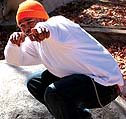You may not think rappers and country rockers meet up too often, but I met Ryan Baucham and Cody Cox of country-rock group Goodman County at Seven*Studioz, where we talked about "ink" (tattoos) for a bit before sitting down with local rap artist Skipp Coon. He said he was familiar with Goodman County's music, and he played some tracks off his latest EP, "A Change Gon' Come." The guys discussed the music industry's shortcomings, day jobs and stories from the road.
Cody: Do you think a lot of rap now is less focused on the words/lyrics, than say, 20 years ago?
Skipp: Yeah … (because) rappers don't own record labels. If you break it down on a corporate level … they'll sell your CD just like they'll sell mine. They don't even look at it like it's art anymore; it's just a product. So, of course, (the industry) is not focused on lyrics anymore—all rap music now sounds alike.
Ryan: Do you think the reason music on the radio sounds the same is because corporations are pushing the same music, or because people are used to the same sound?
Skipp: Clear Channel owns almost all the stations now, and even larger corporations own Clear Channel. If you start breaking it down, (artists) all play for the same team. Listeners are stuck in the middle. They don't know what they like; they like what they know.
Skipp: Do y'all work regular jobs?
Ryan: I work in a warehouse for a pool-supply company. We work during the week and play shows on the weekends, and hope we don't get fired for taking off for shows.
Cody: I'm a high school teacher, but I've been working on my Master's so I can teach on the college level. A lot of weekends, I come home on Friday, change, get in the van, and we won't be back until Sunday night.
Skipp: I work at BeBop—the coolest musician's gig in the world—and I tutor elementary school students. I'm also working on a Master's at JSU.
Skipp: Does it feel rewarding? Do you feel like it's worth it (to balance day-jobs and performing)?
Ryan: Sometimes, but there's times like when we played in Jonesboro for about 1,000 people and nobody paid attention. The dance floor was empty until we finished and they started playing dance music—people flooded the dance floor. The way we look at it is, we got paid anyway. We had fun. It's a practice in front of people.
Skipp: One time I drove to Atlanta for a talent show. I got there, and my show CD wouldn't play. I had to call the guy who made it and go to a hotel to burn a new copy right before the show. Then I got there and the band before me, it seemed like the crowd was their friends. After they finished, everybody left. I performed in front of two people after that.
Ryan: We drove all the way to Tallahassee to open for a cover band, and the place was awful. They had "Girls Gone Wild" videos playing on the TVs, the food and beer was terrible, and we got there during the early hard-core metal show. We set up, were only given 30 minutes to play, and the sound was terrible. Then the cover band gets up there—music majors from Florida State—so you've got a show choir-type guy singing Nirvana songs. It was like the musical version of Nirvana.
Skipp: Who are some of your influences?
Ryan: Jimi Hendrix, Tom Petty, Lucero, My Morning Jacket and Neil Young.
Cody: Johnny Cash, Replacements, Lucero, Will Oldham (Bonnie "Prince" Billy) and Richard Buckner—sometimes if I get stuck writing, I'll put on one of his CDs and write a response to one of his songs. If he has a song about a girl that got her heart broken, I may write a song from the guy's perspective.
Skipp: My favorite album of all time is probably Common's "Like Water for Chocolate." (The Notorious B.I.G.'s) "Ready to Die" is another one and anything by OutKast.
Skipp: What is the production process like for you guys?
Cody: We try to keep the studio versions as close to live as possible. We just did an EP a while back, and all but maybe two guitar tracks were done live.
Skipp: That's how I lay my vocals down … in one or two takes. Production is completely different because I work with loops and samples. I find a sample on a record, and then begin the process of building that track up. Then I come up with the melody and bring musicians in later.
Skipp: Where do you guys record?
Cody: Our drummer's dad owns Coolwater Studios in Clinton. We did a lot of the basic tracks (on the latest album) there, and now we have moved out to Steve Deaton's (of Buffalo Nickel) home studio in Madison.
Ryan: It drives me crazy to go into a record store and see how much people are selling CDs for now that I know how much it costs to put out an album. I know our records don't sound perfect, but I know how much it costs.
Skipp: But you don't have your "ice." You gotta have your ice.
Cody: We have ink, though.
Skipp: It sounds like y'all have the same issues as anyone in the music business.
Cody: Other than styles of music or production what we do is not that much different. If you do these things on your own, take care of your business, cut albums and send it straight to the people who will listen to it, that's the same thing that any musician is trying to do.
Previous Comments
- ID
- 63790
- Comment
oh that's cool how the band names have links so people can listen. Awesome. I do think it's interesting that musicians in varying genres are having the same experiences
- Author
- casey
- Date
- 2006-12-07T15:17:24-06:00


